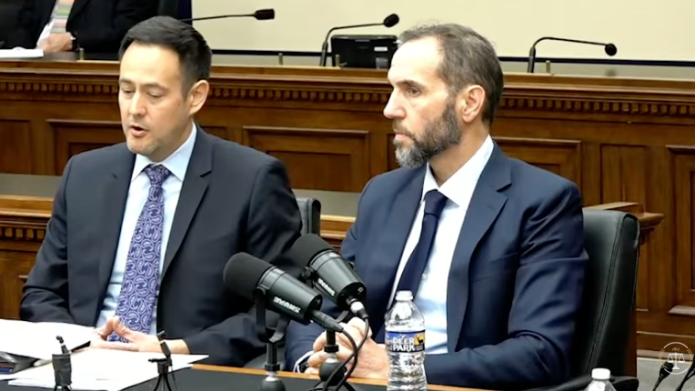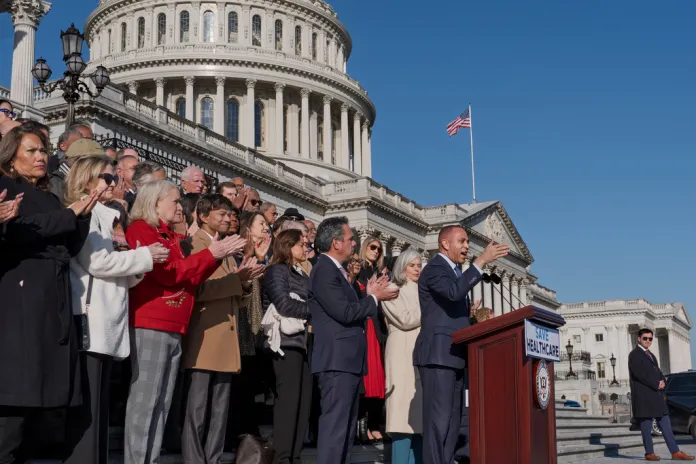Dems Collude With Judges To Keep Noncitizens Voting In Elections
The summary provided discusses a conflict between President Donald Trump and Democratic Party leaders over Executive Order (EO) 14248, signed on March 25, 2025, titled “Preserving and Protecting the Integrity of American Elections.” This EO aims to address election integrity issues such as voter eligibility, ballot fraud, foreign interference, and enforcement accountability, including improving voter roll accuracy and voting machine security.
The EO has been challenged legally by 19 Democratic attorneys general and several Democratic organizations, who argue that elections fall under state jurisdiction as per the U.S. Constitution. Though, supporters of the EO cite constitutional clauses that grant Congress and the president authority over federal elections and execution of laws, justifying the executive orders enforcing election integrity measures.
A significant legal dispute arose regarding proof of citizenship requirements in voter registration. A federal judge issued a temporary injunction against two EO provisions requiring citizenship verification before providing voter registration forms, allowing the continued registration of individuals who may not be U.S. citizens. Critics argue this contradicts federal laws prohibiting non-citizen voting.
Another temporary injunction blocked parts of the EO restricting acceptance of mail-in ballots after Election Day,except for military and overseas voters. These judicial decisions challenge enforcement of existing federal deadlines designed to ensure timely ballot counting in federal elections.
The article criticizes these court rulings as politically motivated and claims a judicial double standard compared to dismissals of election fraud cases from the 2020 presidential election. It suggests that upcoming congressional legislation or Election Assistance Commission actions might resolve citizenship verification issues, while the Election Day ballot timing conflicts will continue to be litigated.
The overall implication is that American voters suffer as legal battles delay or weaken efforts to protect election integrity from fraudulent registrations and late ballots. The author, Garland Favorito, is an election integrity advocate with extensive IT and voting system experience.
A battle appears to be looming between President Donald Trump and the entire upper echelon of the national Democratic Party over Trump’s election Executive Order (EO) 14248. The order was signed on March 25, 2025, and entitled “Preserving and Protecting the Integrity of American Elections.” EO 14248 addresses key election integrity deficiencies involving voter eligibility, ballot fraud, foreign interference, and accountability for wrongdoing. It also implements sorely needed mechanisms to assess the accuracy of voter rolls and the security of voting machines.
EO 14248 was immediately challenged by the “Who’s Who?” of the Democrat Party. Nineteen attorneys general filed a complaint in Massachusetts, while four top Democrat Party organizations filed their complaint in Washington, D.C., along with three civic groups. All similarly challenge certain parts of the election EO with only slightly different arguments.
Constitutional Arguments
At issue is the president’s constitutional power regarding elections. The complainants argue that elections are under the exclusive jurisdiction of the states according to a selective reading of Art. I Sec. IV of U.S. Constitution. The plaintiffs fail to acknowledge the second sentence: “but the Congress may at any time by Law make or alter such Regulations, except as to the Place of Chusing [sp.] Senators.”
Thus, Congress, not the states, has ultimate jurisdiction over federal elections. That clause birthed the National Voting Rights Act (1965), the National Voter Registration Act (NVRA, 1993) and the Help America Vote Act (HAVA, 2002). Despite the clear, plain text of the U.S. Constitution, the attorneys general boldly state twice in their brief that their states will not adhere to those laws because: “Plaintiff States intend to administer federal elections according to State laws …”
Article II, Section II explains the general power of the president in providing: “… he shall take Care that the Laws be faithfully executed …” Thus, the president has unquestioned authority to order that the Executive Branch take any steps necessary to ensure federal and state laws regarding any matter is upheld. That is precisely what EO 14248 does. The EO contains nine key sections, each of which issues Executive Branch orders, carefully crafted with references to federal laws, that the orders help to enforce for United States elections.
Proof of Citizenship
The complaints against the EO allege only theoretical harm since EO 14248 has never actually harmed anyone. With merely speculative claims about the future, the plaintiffs cannot truly meet the legal requirements of a cognizable, particularized injury necessary to establish the proper standing to bring a claim. Nevertheless, Washington, D.C. Judge Colleen Kollar-Kotelly issued a temporary injunction on two provisions involving proof of citizenship. Immediately, several media assets reported that a judge blocked the entire order even though the injunction was temporary and involved only two of roughly 40 total provisions in the order.
The judicial decision temporarily enjoins the president from ordering federal agencies to assess citizenship prior to providing the Federal Voter Registration Form to enrollees of public assistance programs. It also enjoined the president from ordering the Election Assistance Commission (EAC), to amend the National Mail Voter Registration form to include proof of citizenship. Thus, the form can temporarily continue to be used to register potential voters who attest to being citizens of the United States whether they are citizens or not.
This decision does not square well with federal law which states: “It shall be unlawful for any alien to vote in any [federal] election …” 18 U.S.Code § 611(a) and that: “Whoever knowingly makes any false statement or claim that he is a citizen of the United States in order to register to vote or to vote in any Federal, State, or local election … Shall be fined under this title or imprisoned…” 18 U.S. Code § 1015(f).
The executive order simply requires federal agencies to enhance their procedures to enforce federal law pursuant to the president’s constitutional power. To help justify this rather overreaching decision, Judge Kollar-Kotelly stated: “As a consequence, the Democratic Party Plaintiffs and the members they represent face nationwide irreparable harms that this court must remedy.” In other words, Democrats are greatly harmed if they must abide by the law and cannot continue to try and register individuals who are not qualified to vote.
Accepting Ballots After Election Day
On June 13, Massachusetts U.S. District Court Judge Denise Casper, an Obama appointee, issued a temporary injunction on the same two provisions and another against ordering the Department of Defense (DOD) to update the Federal Post Card Application with proof of citizenship.
But this judicial decision went even further by temporarily enjoining a section ordering federal agencies to take steps to prohibit mail-in ballots from being accepted after Election Day (except for military and overseas voters). This decision enjoins an order to the Department of Justice to enforce a federal Election Day deadline for accepting ballots. It also enjoins an order to the EAC to withhold funds from those states that accept ballots after the Election Day deadline.
Accepting late ballots conflicts with federal law which specifies only one Election Day: “The Tuesday next after the 1st Monday in November, in every even numbered year, is established as the day for the election…” 2 U.S. Code § 7. Federal law also provides: “The electors of President and Vice President shall be appointed, in each State, on election day…” 3 U.S. Code § 1. Presidential and vice-presidential electors cannot be appointed on Election Day if ballots are still being accepted and counted afterwards.
The 5th Circuit U.S. Court of Appeals recently confirmed that Election Day is, ‘‘the day by which ballots must be both cast by voters and received by state officials,’’ RNC v. Wetzel (2024). Nevertheless, the 19 attorneys general argued that the plaintiff states will be “harmed” by a “burdensome” effort to enforce existing federal law and Judge Casper allowed such a hollow, speculative claim to stand. Thus, Judge Casper and Judge Kollar-Kotelly have overstepped their bounds in attempting to impose their judicial political will on both the executive and legislative branches of the U.S. Government.
The Judicial Double Standard
Compare these rulings to those from a variety of cases that challenged various aspects of the 2020 general election. Many were dismissed on standing, and others have been delayed for four years despite direct evidence that President Trump was injured by being denied a full public accounting of dubious 2020 election results that were riddled with specific examples of fraud, errors, and irregularities. But now, local judges pretend the president cannot order his own executive branch agencies to enforce existing federal law in compliance with his Article II constitutional power. Such contrasting cases illustrate the disgusting double standard of justice that exists in America through politically motivated judges.
So, what’s next? Challenges to the proof of citizenship component of the EO become moot if Congress passes the Safeguard American Voter Eligibility (SAVE) Act or if the EAC votes in Executive Session to amend the Federal Voter Registration Form for proof of citizenship. Meanwhile, the current Election Day conflict may have to play itself out in federal courts.
But the losers in these unnecessary legal battles are American voters who simply want their election results to be protected from votes cast for non-citizen registrations and not diluted from ballots cast after Election Day.
Garland Favorito is co-founder of Voters Organized of Trusted Election Results in Georgia, VoterGA, a non-partisan, non-profit, volunteer election integrity organization formed in 2006. He is a 40+ year career Information Technology professional with a 20-year background in voting system technology.
" Conservative News Daily does not always share or support the views and opinions expressed here; they are just those of the writer."




